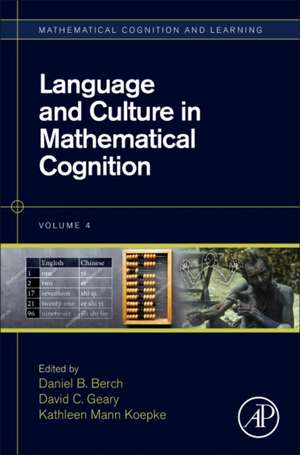Language and Culture in Mathematical Cognition: Mathematical Cognition and Learning (Print), cartea 4
Editat de Daniel B. Berch, David C. Geary, Kathleen Mann Koepkeen Limba Engleză Hardback – 8 ian 2018
- Includes cutting-edge findings, innovative measures, recent methodological advances and groundbreaking theoretical developments
- Synthesizes research from various subdomains of math cognition research
- Covers the full complement of research in mathematical thinking and learning
- Informs researchers, scholars, educators, students and policymakers
Preț: 576.77 lei
Preț vechi: 812.15 lei
-29% Nou
Puncte Express: 865
Preț estimativ în valută:
110.42€ • 113.56$ • 91.60£
110.42€ • 113.56$ • 91.60£
Carte tipărită la comandă
Livrare economică 10-24 februarie
Preluare comenzi: 021 569.72.76
Specificații
ISBN-13: 9780128125748
ISBN-10: 0128125748
Pagini: 364
Dimensiuni: 152 x 229 x 23 mm
Greutate: 0.66 kg
Editura: ELSEVIER SCIENCE
Seria Mathematical Cognition and Learning (Print)
ISBN-10: 0128125748
Pagini: 364
Dimensiuni: 152 x 229 x 23 mm
Greutate: 0.66 kg
Editura: ELSEVIER SCIENCE
Seria Mathematical Cognition and Learning (Print)
Public țintă
Academics/researchers, graduate and undergraduate students specializing in the following disciplines: cognitive psychology; infant cognition; cognitive neuroscience; behavioral genetics; educational psychology; early childhood education; and special educationCuprins
1. Introduction: The Role of Language and Culture in Mathematical Cognition and Development
2. The Effects of Language on Number Word Learning and Estimation
3. Arithmetic in the Bilingual Brain
4. Linguistic Traces in Core Numerical Knowledge
5. Number Knowledge in Preschool Dual-Language Learners from Low-Income Households
6. Mathematical Skills of Children with Specific Language Impairments: Testing Developmental Theory
7. Contributions of Culture and Language to the Development of Space-Number Associations
8. How Culturally Predominant Reading Direction and Number Word Construction Influence Numerical Cognition and Mathematics Performance
9. The Cross-National Learning Gap: Cognitive Mechanisms of Cultural Differences in Mathematics
10. Cultural Comparisons of Children’s Mathematics Achievement: Numerical Language and Core Knowledge
11. Disentangling Linguistic and Experiential Factors as Predictors of Young Children's Early Numeracy Skills
12. Counting Systems as Cultural Tools for Numerical Cognition
13. Linguistic and Cultural Processes in Elementary Mathematics: Studies from a Remote Papua New Guinea Community
2. The Effects of Language on Number Word Learning and Estimation
3. Arithmetic in the Bilingual Brain
4. Linguistic Traces in Core Numerical Knowledge
5. Number Knowledge in Preschool Dual-Language Learners from Low-Income Households
6. Mathematical Skills of Children with Specific Language Impairments: Testing Developmental Theory
7. Contributions of Culture and Language to the Development of Space-Number Associations
8. How Culturally Predominant Reading Direction and Number Word Construction Influence Numerical Cognition and Mathematics Performance
9. The Cross-National Learning Gap: Cognitive Mechanisms of Cultural Differences in Mathematics
10. Cultural Comparisons of Children’s Mathematics Achievement: Numerical Language and Core Knowledge
11. Disentangling Linguistic and Experiential Factors as Predictors of Young Children's Early Numeracy Skills
12. Counting Systems as Cultural Tools for Numerical Cognition
13. Linguistic and Cultural Processes in Elementary Mathematics: Studies from a Remote Papua New Guinea Community




